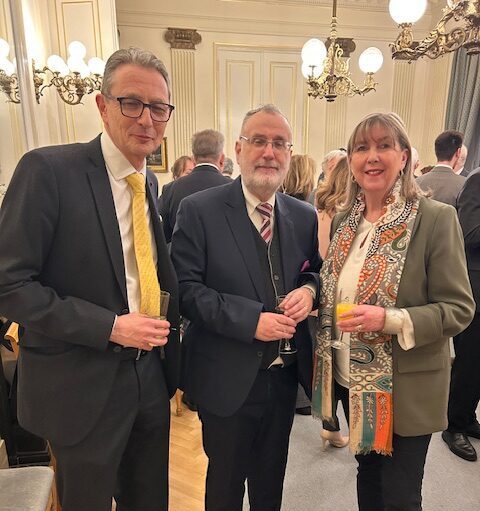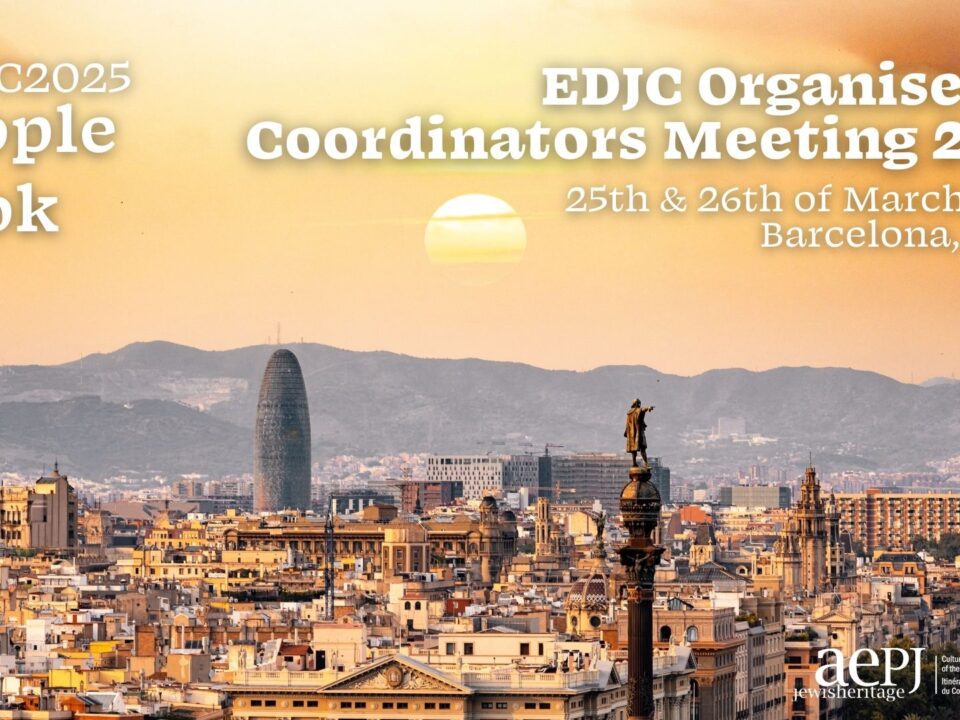- Filter by
- Categories
- Tags
- Authors
- Show all
- All
- AEPJ News
- Andalusia
- Austria
- Azerbaijan
- Balti
- Belarus
- Bendery
- Braunschweig
- Celle
- Chisinau
- EDJC old editions
- EDJC22
- EDJC23
- EDJC24
- EDJC25
- France
- Georgia
- Germany
- Girona
- Hannover
- Hildesheim
- Italy
- Izmir
- Lithuania
- Medieval Route
- Moldova
- National Route
- Orhei
- Padua
- Palaces, Villas and Country Houses
- Poland
- Regional Route
- Rhineland
- Rybnitsa
- Soroca
- Spain
- Thematic Route
- Tiraspol
- Turkey
- Ukraina
- Uncategorized
On February 27th, we took a major step forward with the first online information session for Cities Embracing Jewish Heritage! This inspiring meeting brought together 15 municipality representatives from 7 European countries, eager to explore how they can engage with Jewish heritage, foster inclusivity, and combat antisemitism through cultural initiatives.
During the session, participants were introduced to AEPJ, CAM, and the European Days of Jewish Culture, as well as the new Cities Embracing Jewish Heritage project, designed specifically to support municipalities and governmental institutions in celebrating and preserving their local Jewish history. The discussion was dynamic and full of ideas, with municipalities sharing potential event concepts and expressing enthusiasm about their role in this collective mission.
We are thrilled to have launched this initiative and are confident that this is just the beginning of a project that will continue to grow and make a lasting impact across Europe.
On January 19th and February 2nd the MiDorLeDor Alsace/Baden group held its third and fourth meetings in Offenburg and Strasbourg. The program, led by Françoise Elkouby, President of the Routes of Judaïsme Rhénan, and Christiane Walesch-Schneller, founder of the Blaues Haus in Breisach, involved about 30 participants from Germany and France.
The event in Offenburg began with a guided tour introducing the town’s Jewish history, including a specific activity at the medieval mikveh. This provided an opportunity to discuss the significance of the ritual of purification in Judaism, as well as the historical context of the medieval period.
On the other hand, Francine Mayran (Strasbourg) and Sandra Butch (Freiburg) presented their original and innovative approaches to transmitting the history of the Shoah to younger generations in school classes in both France and Germany, using methods such as the memory suitcase and graphic novels.
AEPJ Director Victor Sorenssen and Scientific Advisor Luca Baraldi recently took part in the 2024 International eConference on Holocaust Studies, organized by the Global Center for Religious Research and the Ackerman Center for Holocaust Studies. The event brought together scholars, educators, and cultural leaders to discuss the evolving role of Holocaust memory in shaping public opinion, countering disinformation, and strengthening social resilience. In a time of increasing polarization and the gradual disappearance of Holocaust witnesses, the need to rethink the way we preserve and transmit memory has never been more urgent.
Traditional approaches have focused on remembrance as a duty, emphasizing loss and moral imperatives. While essential, this approach risks limiting memory’s potential as a tool for action and innovation.
As part of Luxembourg’s presidency of the Council of Ministers of the Council of Europe, a significant meeting of the Bureau of the Congress of Local and Regional Authorities was recently held in Luxembourg. The European Association for the Preservation and Promotion of Jewish Culture and Heritage (AEPJ) had the honor of being the only organization invited to present its certified Cultural Route, the European Route of Jewish Heritage.
Representing AEPJ, President François Moyse showcased the presentation prepared for the 20th anniversary of AEPJ, which took place in Strasbourg last month. He provided insights into the association’s structure, members, and activities, illustrating the success and impact of the European Cultural Routes program, managed by the European Institute of Cultural Routes of the Council of Europe, based in Luxembourg.
The AEPJ is delighted to announce the appointment of Sonja Viličić as the new Project Manager for the groundbreaking initiative Cities Embracing Jewish Heritage. With her extensive experience in cultural management and community-driven projects, Sonja brings a wealth of expertise and enthusiasm to this pivotal role.
Sonja’s professional journey has been nothing short of remarkable. Having worked across Europe, she has spearheaded initiatives that bridge cultural heritage, local development, and social inclusion. Her previous projects include collaborations with Jewish communities, municipal governments, and grassroots organizations. Her ability to connect diverse stakeholders has consistently resulted in innovative solutions that celebrate cultural diversity while promoting sustainable growth.
In her new role at the AEPJ, Sonja will lead the Cities Embracing Jewish Heritage project, a visionary program designed to strengthen the relationship between municipalities and local initiatives dedicated to preserving and promoting Jewish culture and heritage.
Strasbourg, January 23, 2025 – The European Association for the Preservation and Promotion of Jewish Culture and Heritage (AEPJ) marked its 20th anniversary with an extraordinary gathering at the Council of Europe, bringing together approximately 100 distinguished guests, including ambassadors, prominent members of the French Jewish heritage sector, representatives of the Council of Europe, and AEPJ members from across Europe, including Greece, Georgia, Italy, Spain, Germany, Lithuania, and Belgium.
The event featured an inspiring opening session with speeches by Mr. François Moyse, President of the AEPJ, who stated, “Over these two decades, we have built bridges between cultures and generations, from Spain to Poland, from Italy to Lithuania across the European continent. This date is more than just a celebration, it is a recognition of the collective efforts made to preserve and promote Jewish heritage as an integral part of European culture and our shared history.”
The AEPJ is delighted to announce that registration is now open for the EDJC Organisers & Coordinators Meeting 2025, which will take place on March 25–26, 2025, in Barcelona, Spain.
This meeting is a key moment in preparing for the European Days of Jewish Culture, an annual festival that begins on the first Sunday of September and celebrates Jewish heritage through a wide variety of cultural and educational activities across Europe. By fostering inclusion, promoting dialogue, and combating antisemitism, the EDJC continues to make a meaningful impact in building a more cohesive and understanding society.
This year’s festival will explore the theme People of the Book, a reflection on the central role of the written word in Jewish tradition and its deep connections with interfaith dialogue and cultural exchange.
In the framework of this first meeting, several session on the educational scope of the project have been held, followed by a series of presentations of good practices that opened the debate around the change of paradigm that MiDorLeDor Europe proposes: to not only focus on the historical narrative but to put citizenry in the focus of Jewish heritage mediation, to generate an educational impact in order to raise awareness about cultural diversity in Europe, and more specifically dealing with antisemitism. In addition, the event was attended by Marta Eichelberger-Jankowska, Head of Educational Projects at the Taube Center for Jewish Life & Learning, and Marc Francesch-Camps, coordinator of the European Routes of Jewish Heritage by AEPJ, who presented the pillars of the project with the aim of framing the process in the European context.
The Next Routes Transnational training for cultural routes staff took place in Selinunte (Sicily, Italy)in early December, hosted by the Phoenicians’ Route, lead partner of the project, and was designed to enhance digital, creative, and gamification knowledge, skills, and competencies of staff working in various capacities in six Cultural Routes of the Council of Europe.
The training featured four workshop modules developed by the Breda University of Applied Sciences, intended specifically for the representatives of the Cultural Routes participating in the project. The training for representatives of the Cultural Routes addressed the development of digital competencies for marketing, promotion, and communication of cultural heritage, to foster audience engagement. On behalf of AEPJ, The Together Plan, developer of the Jewish route through Belarus, in the framework of the European Routes of Jewish Heritage, participated actively in the full programme, and will be planning subsequent activities throughout 2025 to disseminate the outputs of the project.









